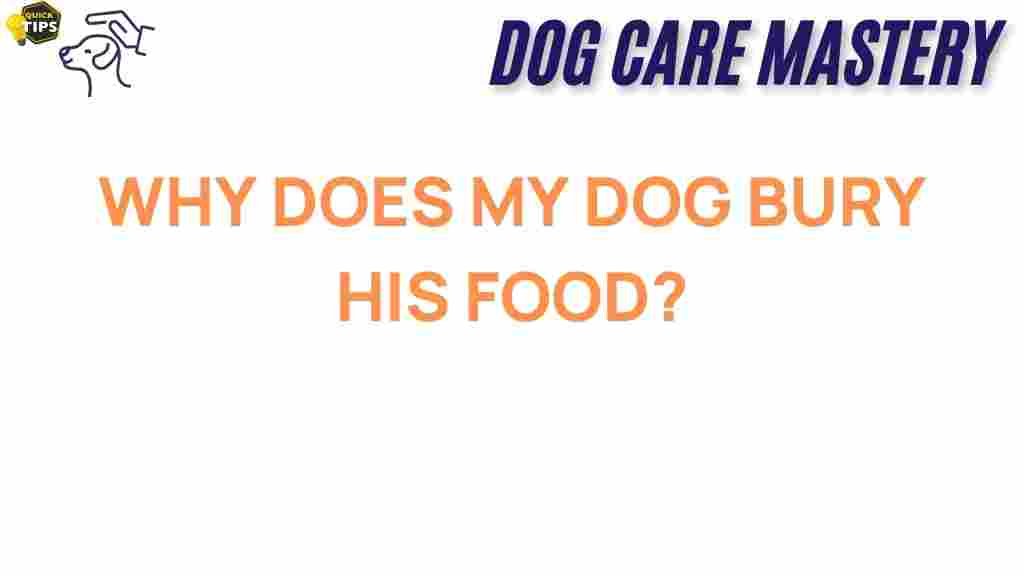Uncovering the Mystery: Dog Behavior – Why Does My Dog Bury His Food?
Have you ever noticed your dog burying his food? This peculiar behavior can leave many dog owners puzzled. While it might seem odd, burying food is a natural instinct for many dogs, harkening back to their wild ancestors. In this article, we will delve into the reasons behind this behavior, explore the evolutionary aspects, and provide tips on how to address it.
Understanding Dog Behavior and Its Roots
To comprehend why your dog buries his food, it’s essential to understand the psychology behind dog behavior. Dogs, being descended from wolves, retain many instincts from their ancestors. Here are some key points to consider:
- Instinctual Behavior: In the wild, wolves would hunt and gather food, burying excess to save for later. This instinct persists in domestic dogs.
- Resource Guarding: Burying food can be a way for dogs to protect their resources from potential competitors.
- Playfulness: Sometimes, burying food can be a playful behavior, as dogs enjoy digging and hiding their treasures.
Reasons Why Dogs Bury Their Food
Understanding the motivation behind this behavior can help you manage it effectively. Here are some common reasons dogs bury their food:
- Survival Instinct: As mentioned, the instinct to bury food is a survival mechanism. In the wild, this behavior ensures they have a food supply when resources are scarce.
- Hoarding Behavior: Some dogs tend to hoard food, similar to how they would in the wild. This is especially common in breeds that are genetically predisposed to this behavior.
- Fear of Competition: If your dog feels threatened by other animals (including other pets in the household), he may bury food to keep it safe.
- Flavor Preservation: Dogs have a strong sense of smell; by burying food, they might be attempting to preserve its scent and flavor for later consumption.
- Play and Exploration: Dogs are naturally curious creatures. Burying food can be a part of their play behavior, where they engage in digging and exploring.
Step-by-Step Process: Observing Your Dog’s Behavior
If you’re concerned about your dog’s food-burying habits, it’s crucial to observe the behavior closely. Here’s a step-by-step process to help you understand better:
- Watch for Triggers: Note the circumstances under which your dog buries food. Is it after meals? When other pets are around? Understanding the triggers can provide insights.
- Evaluate Food Quantity: Ensure you are not overfeeding your dog. Sometimes, they bury food because they feel overwhelmed by the amount given.
- Assess Stress Levels: If your dog seems anxious or stressed, it might be related to environmental factors. A calm environment can reduce anxiety-related behaviors.
- Observe Social Dynamics: If you have multiple pets, observe their interactions. Sometimes, competition among pets can lead to food burying.
- Consult a Veterinarian: If the behavior is excessive or concerning, consult a vet to rule out any medical issues or nutritional deficiencies.
Troubleshooting Tips for Burying Behavior
If your dog’s food burying is becoming a nuisance, here are some troubleshooting tips to manage the behavior:
- Interactive Feeders: Use interactive feeders or puzzles to make mealtime more engaging for your dog. This can reduce the urge to bury food.
- Controlled Feeding: Instead of free-feeding, establish a routine where you provide meals at specific times. This can help manage their instincts.
- Training Commands: Teach your dog commands like “leave it” or “no” to discourage burying behavior when it happens.
- Provide Digging Alternatives: If your dog enjoys digging, consider providing a designated digging area or sandbox filled with toys to redirect their energy.
- Positive Reinforcement: Reward your dog for eating their food without burying it. This creates a positive association with mealtime.
When to Seek Professional Help
While burying food can be a normal dog behavior, there are times when it may indicate a deeper issue. Consider seeking professional help from a dog trainer or behaviorist if:
- The behavior becomes excessive or compulsive.
- Your dog exhibits signs of anxiety or stress.
- You notice changes in eating habits or refusal to eat.
- It affects your dog’s social interactions with other pets.
For more in-depth information on dog behavior and training, you can visit this resource.
Conclusion: Embracing Your Dog’s Unique Behavior
In conclusion, understanding why your dog buries his food can help you appreciate their instincts better. This behavior, rooted in survival and resource management, is a natural part of dog behavior that can be managed with the right strategies. Remember to observe your dog’s unique circumstances and provide a supportive environment. If necessary, don’t hesitate to consult professionals to ensure your dog is happy and healthy.
By embracing your dog’s unique behavior, you can foster a stronger bond and ensure their well-being. Whether it’s through training, providing alternatives, or simply enjoying their quirks, recognizing and understanding their instincts will enhance your relationship with your furry friend.
This article is in the category Behavior and created by dogcaremastery Team
